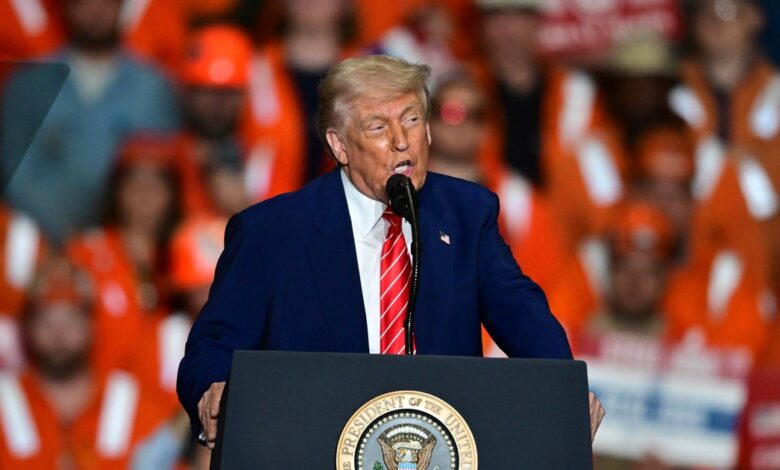Trump says he’s doubling steel tariffs to 50% during visit to U.S. Steel mill near Pittsburgh

President Trump made a significant announcement during his visit to a U.S. Steel mill in the Pittsburgh suburbs, revealing plans to double tariffs on steel to 50%. This decision comes after teasing a potential partnership between U.S. Steel and its Japanese competitor, Nippon Steel. The President stated that the increase in tariffs on steel and aluminum would further secure the steel industry in the United States, with the new tariffs set to take effect on June 4.
The proposed deal with Nippon Steel would allow U.S. Steel to maintain its headquarters in Pennsylvania, marking it as an “investment” and “partial ownership” that will be under U.S. control. While details about the agreement remain scarce, President Trump emphasized the importance of keeping U.S. Steel as an American company and highlighted the positive impact it would have on American jobs.
The announcement regarding the partnership with Nippon Steel follows the Japanese company’s previous unsuccessful bid to acquire U.S. Steel, which was blocked by former President Joe Biden on national security grounds. However, President Trump’s stance on the acquisition has changed, with him now supporting the deal and predicting that it would create and preserve over 100,000 American jobs. He assured workers that there would be no layoffs or outsourcing, with every U.S. Steel employee set to receive a $5,000 bonus.
The agreement with Nippon Steel, according to Senator David McCormick, includes provisions for an American CEO and a majority of U.S. board members. Additionally, there will be a “golden share” held by the U.S. government to ensure that production levels are maintained and that the interests of American workers are protected.
Despite the promises of economic benefits and job security, the United Steelworkers union has expressed concerns about the potential sale to Nippon Steel. The union president, David McCall, stated that they were not consulted in the discussions and cautioned against trusting flashy promises without written commitments that prioritize workers’ interests.
Without an acquisition, U.S. Steel had warned of pivoting away from blast furnace facilities, putting thousands of jobs at risk. The future of the company’s headquarters in Pittsburgh was also uncertain without a partnership. U.S. Steel, which employs around 22,000 people, faces the challenge of balancing economic opportunities with the protection of American jobs and interests.
In summary, President Trump’s announcement of increased tariffs and the proposed partnership with Nippon Steel have sparked both optimism and skepticism. The details of the deal remain to be fully disclosed, but its potential impact on the steel industry and American workers is a topic of keen interest and debate.





